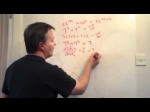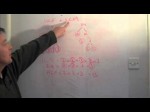How to work out the volume of a cylinder is typically a grade 4 GCSE question.. GCSE Grade C question to calculate the volume of a cylinder with a radius of 3cm and a height of 4cm. How to work out the volume of a can of coke. Just a quick video to calculate if 330ml is accurate. It is... but my estimation shows 380ml ! I've not allowed for the coke can design and … [Read more...]
Why and how to calculate percentages of whole numbers
There are a few ways of learning how to calculate percentages of whole numbers .. .. although this video shows how to calculate percentages by converting to fractions and then cross division. 'Percentage' means 'out of 100.' Therefore we can use the idea of 'equivalent fractions' to make the numbers smaller and easier to deal with. So 12% is exactly the same as … [Read more...]
How to change repeating decimals to fractions proof
Repeating decimals to fractions.. .. is a favourite GCSE question, usually grade 7+ and worth around 2/4 marks. A repeating decimals to fractions question is a little more 'abstract' but, once you understand the principles, it should be relatively straightforward. The answer is to use algebra to show a formal proof. As with most mathematics aim for a logical progression … [Read more...]
How to use the Rules of Indices
How to use the rules of indices is very useful in maths .. ..as it is a convenient way of writing down large numbers that have many repeating terms. It's quicker to write 10^6 than 1,000,000 each time. The index (sometimes called the exponent) simply says how many times the number is used in the calculation. So 10³ is the same as 10 x 10 x 10 which equals 1000. This is … [Read more...]
How to work out the HCF and LCM using factor trees
Factor trees are useful way of showing numbers that divide into the larger number. They're basically a picture with the number at the top and its factors below. So, if we look at the number 42, a typical factor tree could look like either one of these: Notice that the second line in both trees are different. These are still factors of 42 but, if you follow it through … [Read more...]




